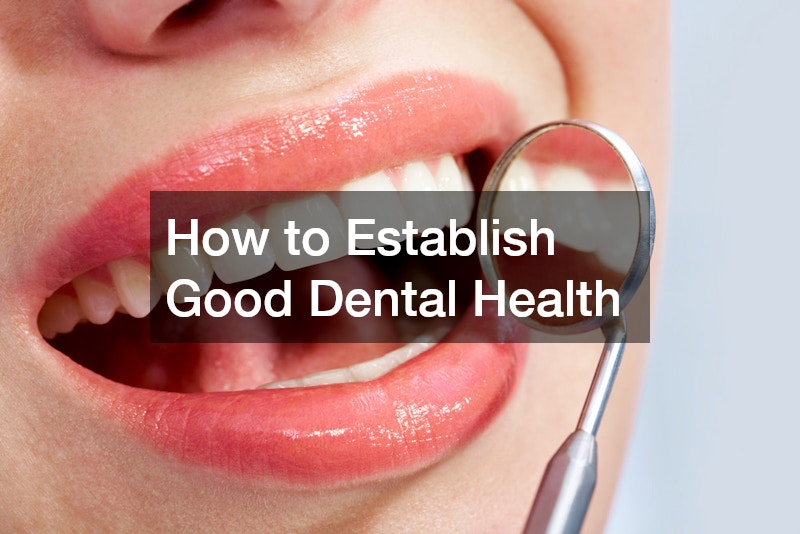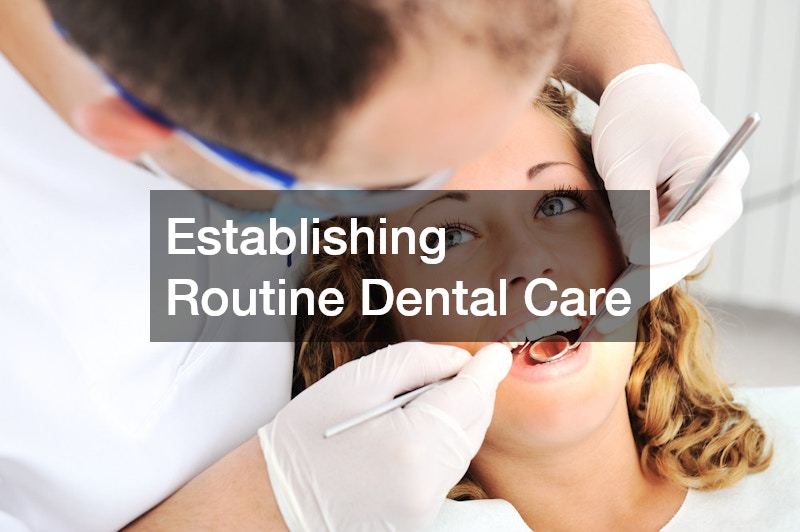
Introduction
Good dental health is an integral part of overall well-being. Maintaining optimal oral hygiene not only contributes to your physical health but also plays a crucial role in enhancing confidence and self-esteem. A radiant smile and healthy gums can be achieved by understanding the basics of dental care and the importance of the right nutrition. This guide aims to provide comprehensive insights into establishing and maintaining impeccable dental health, highlighting the importance of nutrition in every aspect of oral hygiene. By addressing common dental concerns, making informed choices about your diet, and understanding the role of routine dental care, you’ll be empowered to take control of your dental health journey.
How to Establish Good Dental Health

Establishing good dental health begins with both professional care and personal hygiene practices. Regular visits to a pediatric dentist or family dentist ensure that any potential issues are identified and treated at an early stage. A professional cleaning can remove dental plaque that might not be eliminated by regular brushing, reducing the risk of cavities and gum disease. Additionally, a dentist can offer guidance on brushing techniques and recommend products suited to individual needs, particularly for those who wear orthodontic devices or have undergone complex procedures like getting a dental bridge.
The foundation of dental health also involves adopting a disciplined oral hygiene routine at home. Brushing at least twice a day with fluoride toothpaste, flossing daily, and using an antimicrobial mouthwash can significantly reduce the chances of tooth decay and gum problems. It is essential to replace your toothbrush every three months or sooner if the bristles become frayed. Maintaining these good habits not only grants you healthier teeth and gums but also saves on costly dental treatments in the future.
Crucially, the right nutrition plays a pivotal role in maintaining oral health. A balanced diet that includes plenty of water, calcium, phosphates, and essential vitamins contributes to strong teeth and gums. Foods rich in fiber, such as fruits and vegetables, promote saliva production, which is the mouth’s natural defense against bacteria. It is recommended to limit sugar intake, as sugary foods and beverages enhance bacterial growth, leading to cavities. By prioritizing the right nutrition, you are laying the groundwork for a lifetime of excellent dental health.
Foods to Leave off Your Shopping List
While proper nutrition is vital, it is equally important to be aware of foods that can harm dental health. Items with high sugar content, like candies and sodas, should be avoided as much as possible. Sugar is one of the leading causes of cavities, as it fuels the bacteria that produce acid to erode tooth enamel. Acidic foods such as lemons and vinegar can also lead to enamel wear, making teeth more susceptible to decay. Consulting with an orthodontist can provide valuable insights into foods that might affect dental devices and overall oral health.
Processed foods, particularly those high in carbohydrates, can pose a threat to dental health. They tend to stick to teeth, fostering bacterial growth and eventual plaque buildup. It’s best to replace these with healthier alternatives when planning your meals. Pay attention to nutrition labels when grocery shopping, and opt for options with lower sugar levels and fewer artificial additives. Emphasizing the right nutrition is crucial in minimizing risk to your teeth while maintaining a balanced diet.
Avoid sticky foods and snacks that cling to the teeth, such as toffees and raisins. These types of foods can remain lodged in hard-to-reach areas, leading to increased chances of tooth decay. Instead, choose unsweetened versions or make homemade snacks with healthier substitutes. Prioritizing the right nutrition not only benefits your body but also ensures longer-lasting dental health and fewer visits to the dentist for fillings or crowns.
Beverages to Limit
Not all beverages are created equal, and some can significantly impact your dental health. Carbonated drinks and energy drinks are high in sugar and acids, contributing to enamel erosion and cavities. These beverages create an acidic environment in the mouth, exacerbating gum pain and adversely affecting teeth. Opting for healthier alternatives like water, herbal teas, or diluted fruit juices can mitigate these effects and support the right nutrition for optimal oral health.
Alcoholic beverages can also have detrimental effects on dental health. They lower saliva production, crucial for neutralizing acids and washing away food particles. Dehydrated oral tissues become more prone to infections and gum diseases. Limiting alcohol intake and ensuring proper hydration with water promotes healthy gums and teeth, alongside cushioning potential damage inflicted by occasional indulgences.
Caffeinated drinks, such as coffee and tea, while offering some health benefits, should be consumed in moderation. Excessive caffeine can lead to dry mouth, increasing the risk of cavities and bad breath. To counteract this, consider regular water intake and limiting sugar additives. Implementing these mindful choices supports the right nutrition and contributes to better dental outcomes in the long run.
Oral Hygiene Basics at the Grocery Store

Creating a grocery list with oral hygiene in mind can be the first step toward maintaining healthier teeth and gums. When selecting toothpaste, choose one that contains fluoride, as it strengthens enamel and helps prevent decay. Fluoride mouth rinses can further protect your teeth and enhance brushing effectiveness. Speak with a dentist for personalized recommendations, especially for those who have a dental bridge or other dental devices.
A toothbrush with soft bristles is gentler on gums and effective at removing plaque without causing damage. It’s important to replace it every three to four months. Moreover, investing in dental floss or interdental cleaners should be prioritized, as these are indispensable for cleaning the spaces between teeth that a toothbrush might miss. Tailoring your grocery list with these essentials in mind helps fortify your dental routine and encourages the right nutrition for your oral health regimen.
Adding products like sugar-free gum to your list can be beneficial, stimulating saliva production and reducing the acid level in your mouth. Chewing gum for a few minutes after meals further assists in cleaning teeth. Prioritize brands that promote dental health and adhere to ADA recommendations. These basic oral hygiene products assist in cultivating a balanced lifestyle that emphasizes the right nutrition and comprehensive dental care.
What Causes Cavities?
Cavities are a result of tooth decay, which occurs when the protective enamel on your teeth is eroded by acid-producing bacteria. Poor oral hygiene practices, such as irregular brushing and flossing, create an environment where plaque, a film of bacteria, can thrive. Over time, these bacteria produce acids that weaken enamel and lead to cavities. Regular visits to your dentist for check-ups and teeth fillings help address issues proactively and maintain dental health.
Dietary choices heavily influence the development of cavities. High consumption of sugary and starchy foods feeds bacteria that produce acidic by-products. These acids erode the enamel, leading to mineral loss and, eventually, cavities. Incorporating the right nutrition by minimizing sugar intake and increasing fluoride consumption can strengthen teeth and mitigate decay risk.
Saliva plays a critical role in cavity prevention, as it naturally cleanses the mouth and neutralizes acids produced by plaque bacteria. Factors such as dehydration, certain medications, or health conditions can reduce saliva production. Ensuring proper hydration and consuming saliva-stimulating foods can enhance this natural defense mechanism. Consistently focusing on the right nutrition while seeking professional dental advice empowers you to prevent cavities and maintain a healthy smile.
Foods to Consider Buying
Stocking your pantry with wholesome foods that contribute to dental health can make a significant difference. Foods rich in calcium and phosphates, such as dairy products, nuts, and dark leafy greens, help strengthen tooth enamel and bones. These nutrients are crucial for teeth reconstruction and repair, maintaining high standards of oral health. Incorporating these items into your diet is a testament to the importance of the right nutrition.
Fruits and vegetables high in fiber not only aid digestion but are also great for your teeth. They stimulate saliva flow, which helps wash away food particles and bacteria. Apples, carrots, and celery are excellent choices and can be ideal snacks throughout the day. This type of right nutrition is a simple yet effective way to cleanse the teeth and support healthier gums.
Cheese and yogurt are not only rich in calcium but also contain beneficial probiotics that promote oral health. They help balance the pH levels in your mouth, minimizing the harmful effects of sugars and acids. These dairy options are perfect additions to a balanced diet and exemplify how the right nutrition can positively impact dental care.
Kid Snack Options

Providing healthy snack options for children is essential in promoting dental health from an early age. Fresh fruits, such as sliced apples and strawberries, are delicious and naturally supportive of teeth cleaning due to their fibrous texture. Introducing children to a variety of fruits establishes good eating habits that reinforce the importance of the right nutrition. It may even reduce the need for future dental interventions like affordable dental implants.
Nuts and seeds can be excellent alternatives to sugary snacks, rich in essential nutrients for healthy teeth. They offer crunchiness and satisfaction while delivering calcium, vitamin D, and other vital teeth-strengthening components. Almonds, walnuts, and sunflower seeds are among the favorites that can please any child’s palate while upholding commendable dental health attributes.
Encourage kids to enjoy dairy snacks like cheese sticks and yogurt cups. These snacks are not only packed with calcium but also facilitate healthy teeth development and make sure that little ones receive the right nutrition for strong teeth. By guiding children to make wise snack choices, they learn the value of balanced, health-promoting foods over sugary, processed alternatives.
Building a Healthy Diet
Establishing a balanced diet with an emphasis on dental health is a vital step toward comprehensive well-being. Start by curating a menu plan enriched with fruits, vegetables, proteins, and whole grains to ensure a wide spectrum of nutrients. This fundamental dietary structure promotes overall health and fulfills the requirement for right nutrition, impacting dental and bodily well-being.
Family dentistry can offer personalized advice on diet and lifestyle, tailored to meet individual needs and preferences. These insights help recognize foods that could potentially compromise dental health, empowering families to make adjustments. Consulting your family dentist periodically complements the right nutrition plan, enhancing your oral and overall health positively.
Recognizing harmful dietary habits and making pivotal changes is part of this transformative process. Transitioning from processed foods to fresher, nutrient-dense options nourishes the body and encourages better oral health. Implementing these dietary adjustments fosters a health-conscious approach that emphasizes right nutrition, leading to improved dental care outcomes.
Correcting Major Dental Issues
Despite best efforts, dental issues can sometimes arise, necessitating corrective measures and interventions. Addressing problems early ensures they do not escalate, causing more significant complications down the line. Common corrective procedures include fillings for cavities, a dental crown to restore damaged teeth, and dental bridges to replace missing teeth. Timely intervention with a dentist familiar with these issues can be decisive for sustaining optimal dental health alongside the correct nutrition.
For those who fear dental procedures, a sedation dentist can provide relief by offering conscious sedation options. This approach enables patients to undergo necessary dental work, like extractions or implants, without undue anxiety. Collaborating with a compassionate dental practitioner offers a more comfortable experience, ensuring corrective measures modestly undertaken without compromising on right nutrition.
In extreme cases of tooth loss, an affordable dental implant can provide a permanent, aesthetically pleasing solution. Implants involve placing an artificial tooth root that anchors a replacement tooth into the jawbone, preserving both appearance and function. Attending regular dental appointments, combined with a commitment to right nutrition, fosters a positive healing environment and successful outcomes for these advanced procedures.
Establishing Routine Dental Care

The significance of routine dental care cannot be overstated. Regular visits to the dentist for professional cleanings and examinations maintain healthy teeth and gums while preventing more significant dental problems. Seeing your dentist twice a year ensures a proactive approach to oral health, where minor issues are managed promptly, minimizing the need for invasive procedures. This steadfast commitment aligns with the ethos of right nutrition in promoting excellent dental care.
While professional dental care is vital, maintaining daily oral hygiene practices contributes to sustaining oral health between appointments. Develop a comprehensive routine that includes brushing, flossing, and using antibacterial mouthwash daily. These practices, along with routine dental checkups, serve as the foundation for a lifetime of healthy smiles upheld by the right nutrition.
Teeth whitening services are popular among those seeking to enhance their smiles, further exemplifying the crossover between aesthetic desires and good dental care. This procedure, performed by trained professionals, improves teeth appearance while ensuring health is not compromised. By incorporating routine dental visits and the right nutrition into your lifestyle, you lay the framework for enduring, healthy dental choices.
Conclusion
Establishing optimal dental health requires a multifaceted approach encompassing regular dental care, effective oral hygiene, and the right nutrition. Emphasizing the importance of these elements throughout life cultivates a foundation for resilience against common dental challenges and supports overall wellness. Understanding the role of a pediatric dentist early on helps implement positive habits that persist into adulthood. Consulting with an orthodontist can refine your diet and dental practices, ensuring you are equipped to sustain excellent oral health.




